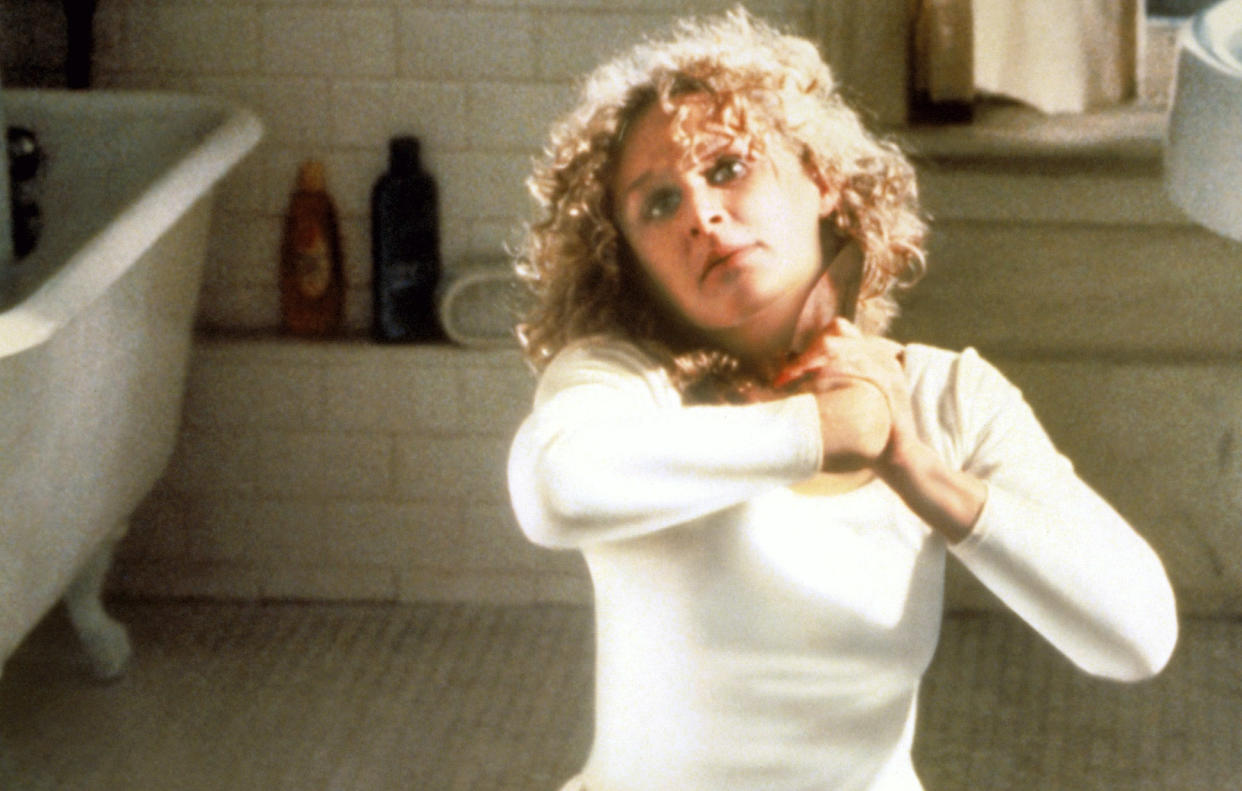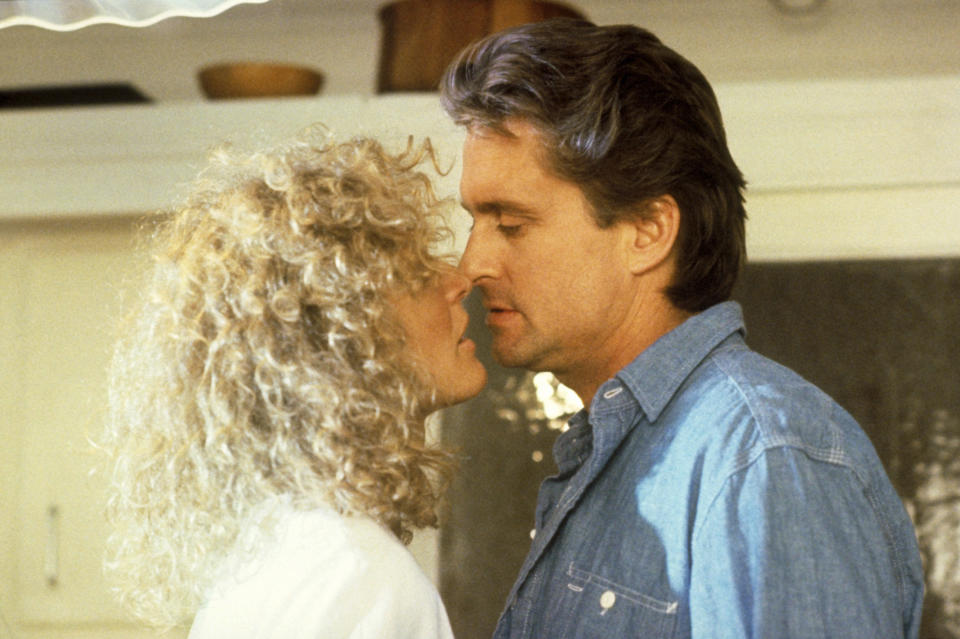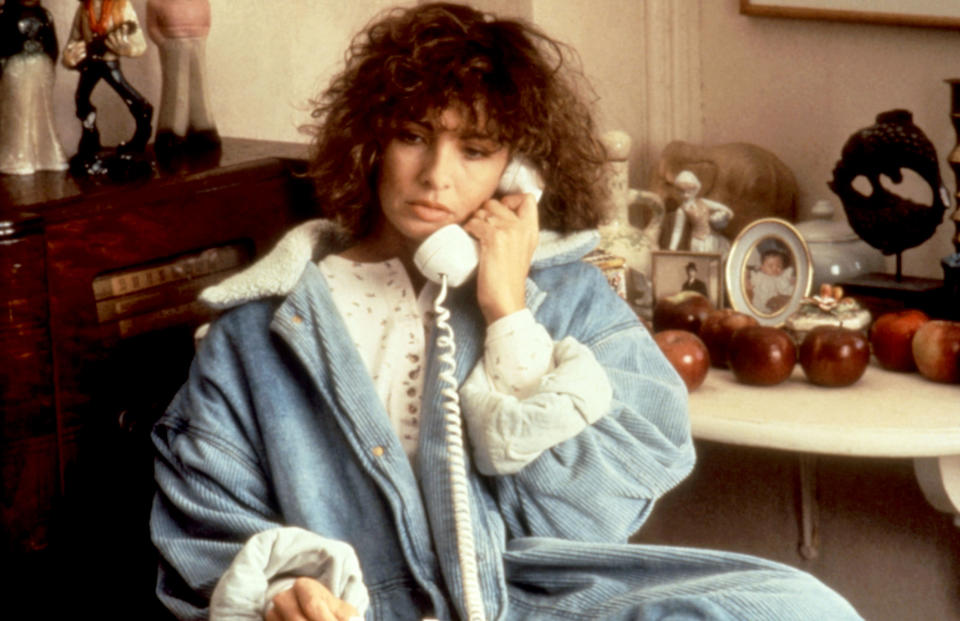'Fatal Attraction' director Adrian Lyne reflects on the film's controversial original ending: 'The other ending felt flat'

Ever since it’s release in 1987, Fatal Attraction has belonged to that select class of movies that’s almost more famous for how it didn’t end. Think First Blood, where Sylvester Stallone’s John Rambo originally died in the final moments instead of surviving to draw more blood in four sequels. Or Pretty in Pink, which initially had Andie and Duckie as the movie’s one true pairing until test audiences revolted. Test screenings were also the reason why Fatal Attraction director, Adrian Lyne, abandoned the downbeat ending he filmed for his marital drama about a brief affair gone horribly wrong in favor of a bloody finale that’s closer to a horror movie.
But the director stands by his decision three decades later. “The other ending felt flat — it’s as simple as that,” Lyne tells Yahoo Entertainment now. “[Producers] Stanley Jaffe, Sherry Lansing and I watched a preview, and we felt that, dramatically, it didn’t work that well. In the end, I think the ending we eventually shot is better than the original.”

Viewers at home can judge for themselves courtesy of a new Blu-ray edition of Fatal Attraction, which is available in stores on April 21 and includes the discarded ending as part of its bonus features along with a Lyne-helmed commentary track and behind-the-scenes rehearsal footage. (Fatal Attraction, King Creole and To Catch a Thief are the first three releases in Paramount’s new speciality Blu-ray label, Paramount Presents.)
Written by James Dearden, the film was 1987’s third highest-grossing movie behind Beverly Hills Cop Part II and Platoon in large part because of its titillating subject matter. Michael Douglas plays Dan Gallagher, a prosperous husband and father who enjoys a wild weekend fling with Alex Forrest (Glenn Close) while his wife Beth (Anne Archer) is out of town. But Alex doesn’t think of their relationship as a fling: Refusing to be jilted, she goes to scary lengths to stay in Dan’s life, whether it’s stalking him in a parking lot or boiling the family’s pet rabbit alive.
Throughout Dearden’s script — which was adapted from his 1980 British short film, Diversion — Alex makes frequent references to her favorite opera, Madama Butterfly, which ends with the spurned heroine killing herself. And that’s the same way things played out in the first version of Fatal Attraction’s final moments, with a pregnant Alex slitting her throat in the bathroom of her Manhattan apartment. In a final attempt to force a reckoning for Dan, she uses the knife he picked up during their final face-to-face confrontation. The police subsequently trace the fingerprints on the knife back to Dan, and take him into custody. In a final twist, Beth finds a cassette tape that Alex made before her suicide that reveals her plan, thus ensuring Dan’s freedom.
During production, that ending felt right to Lyne and the creative team. But when they saw the film cut together, it quickly became a concern. “The last 20 minutes of the movie fell flat,” Lyne explains, adding that it was he and the producers — rather than the studio — that made the call to reconceive the ending. In the new version, Alex invades the Gallagher’s suburban home, and attempts to kill Beth while she’s in the bathtub. Dan bursts in and seemingly drowns her, but it’s Beth who ultimately delivers the kill shot, firing a bullet squarely into Alex’s chest.
It’s an action-oriented finale that wouldn’t be out of place in a John Carpenter movie. (Funnily enough, Carpenter was among the other directors considered for Fatal Attraction, but turned it down.) And, not surprisingly, it proved a big hit with audiences, both in test screenings and general release. Nevertheless, Lyne is quick to insist that improving the movie’s box-office prospects was never the goal. “It didn’t have to be reshot: It was a choice. People have often said, ‘Oh they were trying to squeeze another nickel out of it,’ but that wasn’t it. It was an emotional and dramatic choice, not a financial one.”
That said, Lyne also admits to feeling some initial reluctance about changing the ending — feelings that were famously shared by both Archer and Close. According to Lansing’s 2017 biography, Close refused to shoot a different finale, an account that the director confirms. “I remember talking to Glenn about the end, because she was very upset,” he remembers. “We were all reluctant initially because there was something nice about the idea of the ending reflecting the opera.” Lyne eventually drew on two elements of the existing film to make the new ending slightly more palatable to both actresses. “Somebody said that the only innocent party in the movie is Beth, so it had a certain logic that [Alex’s death] would come from her,” he says of how he approached Archer’s revised role.

With Close, meanwhile, he thought carefully about how to approach Alex’s final attack so that she wouldn’t become a Michael Myers clone. “We wanted to find a way to do it without her being an obvious knife-wielding lunatic, so we talked a lot of her physicality,” Lyne recalls. “I remember thinking that it would be interesting for her to have the knife down by her side, cutting the material of her dress and even cutting into her [skin] and her not feeling it. At that stage, she’d be quite psychotic and was capable of anything.”
At the time and still today, Lyne says that his sympathies lie with Alex rather than Dan, in large part because of Close’s Oscar-nominated performance. “There's a moment when she comes to the office and tries to persuade Dan to go to the opera with her. At the end of the scene, they hug and the camera see her reaction to him hugging her and it's so heartbreaking because you know she loved him. Every time I see that scene I think, ‘F***, what a wonderful actress.’”
Watching Fatal Attraction again in the #MeToo era, most viewers will probably now find themselves siding with Alex rather than Dan, who spends much of the movie trying to shirk any responsibility for the affair and what it does to Alex. “He thought that he could have a one-night stand and get away with it,” Lyne says of Douglas’s character. “Quite often, [Michael] would say to me, ‘Let me be proactive,’ and I would reply: ‘How can you? What you did was wrong.’ He felt that he was taking this punishment, and my feeling was that he had to. That that was the character, and he wasn't blameless.”
Lyne is also quick to note that while the movie ends with Alex’s violent demise, the rift in the Gallagher household hasn’t necessarily been healed. In the final shot of the film, Beth and Dan embrace in their foyer and then exit the frame as the camera pushes in on a family portrait showing them in happier times. “I always saw that in an ironic way,” Lyne says of that final moment of the revised ending. “I never thought they were going to go back to an idyllic relationship, although some people took it literally.”
Paramount Presents: Fatal Attraction is available on Blu-ray on April 21 at major retailers including Amazon and Best Buy
Read more from Yahoo Entertainment:

